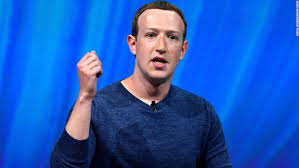Facebook is reportedly planning to change its corporate name next week to reflect its focus on building the metaverse.
A source with direct knowledge of the proposed rebranding plan confirmed that the new name change has been scheduled for next Thursday, October 28th.
A news report by an online medium, the verge.com, noted that the coming name change, which CEO Mark Zuckerberg plans to talk about at the company’s annual Connect conference on October 28th, but could unveil sooner, was meant to signal the tech giant’s ambition to be known for more than social media and all the ills that entail.
According to the news medium, the rebrand would likely position the blue Facebook app as one of many products under a parent company overseeing groups like Instagram, WhatsApp, Oculus, and more.
However, a spokesperson for Facebook was reported to have declined to comment on the proposed name change plan.
It also reported that Facebook already had more than 10,000 employees building consumer hardware like AR glasses that Zuckerberg believes will eventually be as ubiquitous as smartphones.
In July, Zuckerberg told the online medium that, over the next several years, “we will effectively transition from people seeing us as primarily being a social media company to being a metaverse company.”
It is also being speculated that a rebrand could also serve to further separate the futuristic work Zuckerberg is focused on from the intense scrutiny Facebook is currently under for the way its social platform operates today.
The Verge.com further reported that a former employee turned whistleblower, Frances Haugen, recently leaked a trove of damning internal documents to The Wall Street Journal and testified about them before Congress.
Based on the testimonies and other related matters, the news medium reported that antitrust regulators in the US and elsewhere are trying to break the company up even as public trust about how Facebook does business is waning.
It further reported: “Facebook isn’t the first well-known tech company to change its company name as its ambitions expand. In 2015, Google reorganized entirely under a holding company called Alphabet, partly to signal that it was no longer just a search engine, but a sprawling conglomerate with companies making driverless cars and health tech. And Snapchat rebranded to Snap Inc. in 2016, the same year it started calling itself a “camera company” and debuted its first pair of Spectacles camera glasses.
“I’m told that the new Facebook company name is a closely-guarded secret within its walls and not known widely, even among its full senior leadership. A possible name could have something to do with Horizon, the name of the still-unreleased VR version of Facebook-meets-Roblox that the company has been developing for the past few years. The name of that app was recently tweaked to Horizon Worlds shortly after Facebook demoed a version for workplace collaboration called Horizon Workrooms.
“Aside from Zuckerberg’s comments, Facebook has been steadily laying the groundwork for a greater focus on the next generation of technology. This past summer it set up a dedicated metaverse team. More recently, it announced that the head of AR and VR, Andrew Bosworth, will be promoted to chief technology officer. And just a couple of days ago Facebook announced plans to hire 10,000 more employees to work on the metaverse in Europe”, it added.
Zuckerberg was reported to have told The Verge’s Casey Newton this summer that: “The metaverse is “going to be a big focus, and I think that this is just going to be a big part of the next chapter for the way that the internet evolves after the mobile internet.And I think it’s going to be the next big chapter for our company too, really doubling down in this area.”
According to the online medium, complicating matters is that, while Facebook has been heavily promoting the idea of the metaverse in recent weeks, it’s still not a concept that’s widely understood.
The term was coined originally by sci-fi novelist Neal Stephenson to describe a virtual world people escape to from a dystopian, real world. Now it’s being adopted by one of the world’s largest and most controversial companies — and it’ll have to explain why its own virtual world is worth diving into.






